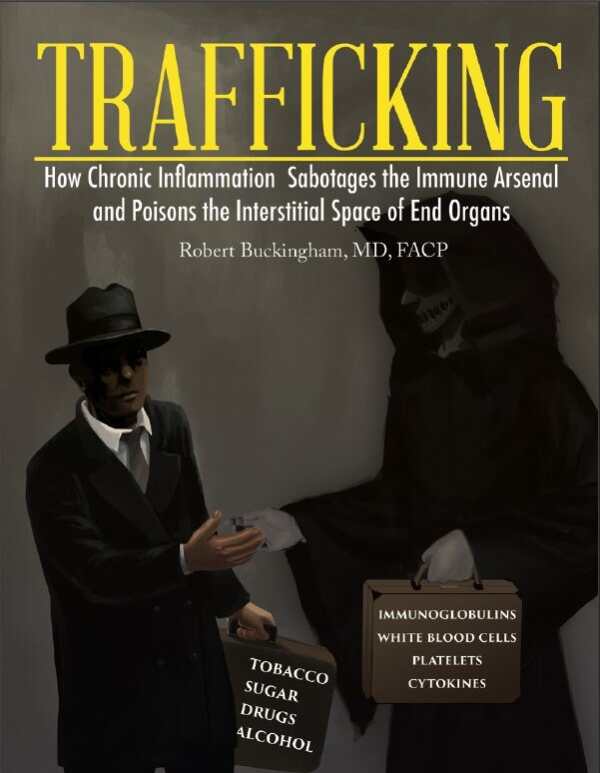
Trafficking
How Chronic Inflammation Sabatoges the Immune Arsenal and Poisons the Interstitial Space of End Organs
Trafficking rethinks the common, often ineffective, notions of how to achieve health to bring hope to those in need of relief.
Robert Buckingham’s Trafficking explores the roots of patterns of damage in the body and compellingly envisions a better future.
Pain, fatigue, and generally poor health are seemingly pandemic. This book identifies the ways that people sabotage themselves, such as poor diets, a lack of exercise, and other detrimental lifestyle choices. Compounding the problem, it says, is the fact that medial professionals don’t take the time or have the understanding needed to help people change their behaviors; that’s the insight that this book brings. By delving into deep understandings of the body, it moves beyond quick fixes to encourage real change and real healthiness.
What causes chronic pain and fatigue? It’s an overwhelming question that stumps many facing pain, but the book sees a solution and demystifies the mystery, purporting that inflammation poisons the body. That inflammation, it claims, is caused largely by people’s choices and leads to a toxic internal environment, resulting in issues with the brain, heart, lungs, kidneys, and liver.
If believed, the impact of this innovative view of health is staggering. The key to healing, it claims, is trafficking—controlling the flow of the “immune arsenal” in and out of interstitial spaces. It sounds complex, even farfetched, but the book breaks down its key concepts to appealingly put a renewed, long, healthy, vibrant life within reach.
The book uses parables to make the invisible processes of the body easy to understand, but the bulk of the text is a to-the-point medical description that is both technical and accessible. Buckingham has decades of experience as a physician, including in noninvasive cardiac care, and he brings that expertise to bear for other medical professionals and for people who want to invest in their health.
The tone is focused and professional, befitting the vital information and deep study it conveys, and the pacing is even and smooth, allowing the information to sink in deeply even as the insights move steadily onward. The book is organized methodically, introducing key concepts and building up its ideas in order to facilitate thorough understanding.
Even for medical professionals, the book’s detailed explanations (and glossary) will prove essential. So much of what’s conveyed is outside of the traditional rut of modern medicine and holistic health rhetoric. Indeed, in many ways this book feels like a fusion, wholly integrated and seamless, of traditional medicine and complementary therapies.
Trafficking rethinks the common, often ineffective, notions of how to achieve health, expanding the idea of what’s possible in order to bring real hope to people in need of relief.
Reviewed by
Melissa Wuske
Disclosure: This article is not an endorsement, but a review. The publisher of this book provided free copies of the book and paid a small fee to have their book reviewed by a professional reviewer. Foreword Reviews and Clarion Reviews make no guarantee that the publisher will receive a positive review. Foreword Magazine, Inc. is disclosing this in accordance with the Federal Trade Commission’s 16 CFR, Part 255.
